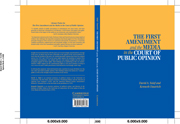Book contents
- Frontmatter
- Contents
- List of Tables and Figures
- Preface and Acknowledgments
- 1 Freedom of the Press and the Power of Public Opinion
- 2 Surveying the Public on Press Freedoms
- 3 What Americans Know About the Freedom of the Press
- 4 Public Support for the Freedom of the Press
- 5 Support for Press Freedoms Across Media: Comparing Print, Electronic, and the “New Media”
- 6 Support for Press Freedoms within a Medium: Elite, Mainstream, and Tabloid News Sources
- 7 Public Opinion, the First Amendment, and the Challenges of the Twenty-First Century
- Appendix: Annotated Questionnaires
- References
- Index
7 - Public Opinion, the First Amendment, and the Challenges of the Twenty-First Century
Published online by Cambridge University Press: 05 June 2012
- Frontmatter
- Contents
- List of Tables and Figures
- Preface and Acknowledgments
- 1 Freedom of the Press and the Power of Public Opinion
- 2 Surveying the Public on Press Freedoms
- 3 What Americans Know About the Freedom of the Press
- 4 Public Support for the Freedom of the Press
- 5 Support for Press Freedoms Across Media: Comparing Print, Electronic, and the “New Media”
- 6 Support for Press Freedoms within a Medium: Elite, Mainstream, and Tabloid News Sources
- 7 Public Opinion, the First Amendment, and the Challenges of the Twenty-First Century
- Appendix: Annotated Questionnaires
- References
- Index
Summary
James Madison's experience with the Virginia Bill of Rights was by no means reassuring: Its provisions had been flagrantly ignored whenever they were “opposed to a popular current.” Thus Madison openly doubted whether adding an explicit bill of rights to a federal constitution built on the premise of enumerated powers would perform much of a service, especially during those moments when its guarantees were most controversial. Notwithstanding the explicit provisions contained in the Bill of Rights that was ratified in 1791, Madison firmly believed that continued public support for those provisions would also be required, lest they be reduced to mere “parchment barriers” against legislative or executive tyranny.
Throughout this book we have taken Madison's fears to heart in exploring the relationship between public opinion and freedom of the press. We examined public knowledge of freedom of the press at the broad level of its existence in the U.S. Constitution, and we investigated public awareness of freedom of the press issues as they apply to contemporary U.S. society. We explored dimensions of support for freedom of the press and attempted to come to grips with “abstract” and “specific” conceptualizations of it. And we studied the approach the public takes to applying press freedoms in a rather complex media environment – one filled with a variety of different forms of media (ranging from the Internet to newspapers to television) as well as very different sources within each medium (ranging from Hustler and “The Jerry Springer Show” to Business Week and “NBC Nightly News”).
- Type
- Chapter
- Information
- The First Amendment and the Media in the Court of Public Opinion , pp. 111 - 122Publisher: Cambridge University PressPrint publication year: 2002



